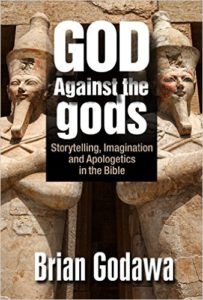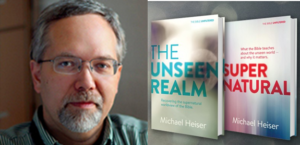“The Christian should be the person who is alive, whose imagination absolutely boils, which moves, which produces something a bit different from God’s world because God made us to be creative.” Francis Schaeffer
Understanding the world we live in and how to live an impactful life was the crux of Francis Schaeffer’s life and work. He encouraged his generation of Christians to take their writing, art, and storytelling seriously for the glory of God as well as for the testimony of Christ. This legacy continues to inspire artists of every genre and I am pleased to say that Brian Godawa has taken up the task of exceptional storytelling, using imagination and apologetics to tell the “grandest story ever told.”
In “God Against the gods: Storytelling, Imagination, and Apologetics in the Bible,” Godawa takes aim at several lofty goals, and hits the bull’s-eye of each one. Of primary importance in this writer’s view is that Godawa states that the Bible takes a far different view of historicity than modern people do.
Godawa’s claim is that the Bible uses mythopoeic and figurative language intentionally, but that this usage in no way undermines the truthfulness or the theological accuracy of what is stated. This is an important point for modern readers who have a somewhat different understanding of what constitutes historical accuracy and even truth.
It is an impressive assertion that God never intended to satisfy the rigorous and often ridiculous demands of critics throughout the ages who would point to this passage or that statement as an example of why the Bible cannot be trusted. Instead Godawa argues that God’s inspiration of the biblical texts remains intact, having been providentially guided for His purposes, by intentionally utilizing imagery, symbolism, metaphor, and poetic figurative language much the way Jesus Christ did during His public ministry. In this way Godawa is arguing against the modernist obsession with rational abstraction and empirical observation as the only gate keepers of truth.
To make his case Godawa presents seven chapters based on articles and essays he has written that explore various topics such as:
- God’s intentional unmasking of the spiritual reality behind pagan gods.
- How Israel’s use of mythopoeic elements shared with other Near Eastern peoples can be used apologetically today.
- The biblical depiction of our universe is a theological expression of the grandeur of God and not a detailed physical or scientific expression.
- Paul’s sermon on Mars Hill is really a powerful Christian theistic worldview apologetic.
Readers will find a thorough and thought-provoking examination of such things as the true meaning behind “the host of heaven” and God’s “divine council”; of the penchant of Hollywood filmmakers to use Near Eastern mythopoeia to make blockbuster movies (hat-tip to the 2012 Marvel adaptation, The Avengers); of the necessity of understanding the Bible through a supernatural Near Eastern worldview which by the way, is very different from our own; how biblical cosmology/cosmography is not aimed toward scientific concordism, and it is a mistake to insist on that outcome; and the relationship between metaphor and prophecy especially in the eschatological genre.
In God Against the gods, Brian Godawa has provided a wonderful primer for the Christian apologist, author, and Bible student who is interested in engaging our modern world with powerful information and answers to questions commonly asked by those searching for understanding and truth.
Brian Godawa’s website – www.godawa.com
*A copy of this book was provided to me in PDF format free of charge. I received no remuneration for this review.


